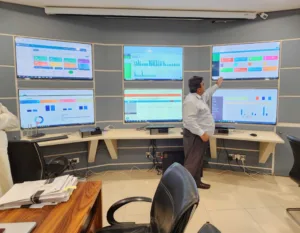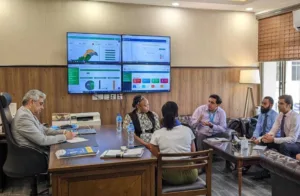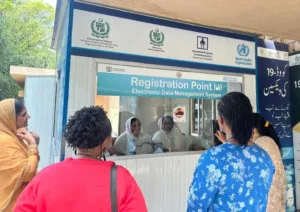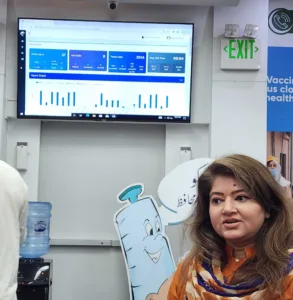EXCEPTIONAL EFFORTS IN THE EFFECTIVE USE OF DATA
by Nelima Otipa, Senior Program Manager for Impact, Nexleaf Analytics
Introduction
In our line of work, it’s not uncommon to witness individuals facing significant challenges in their efforts to provide proper healthcare to the population. Within these challenges, we often discover remarkable stories of everyday events that may seem ordinary to the locals but appear extraordinary to visitors.

There’s a Swahili saying: Mgeni aje, mwenyeji apone, which roughly translates as “a visitor’s arrival reprieves the native.” In this context, the visitor notices things that feel ordinary, but are in fact outstanding. Needless to say, we were deeply impressed by what we observed during our visit to Pakistan.
In a world overflowing with many forms of data, witnessing effective data utilization is truly refreshing. At Nexleaf, we often wonder: how can we ensure data is put to good use, especially within a healthcare system? What does this data utilization actually entail? During our August 2023 trip to Pakistan, we got some insights.
Data Leadership at High Levels
 As we entered the office of Dr. Kazi, the Director General of the Federal Directorate of Immunization, we were not only struck by its neat appearance but also by a noteworthy feature: adjacent to his desk, we saw a large screen displaying key immunization indicators in a colorful and visually appealing manner. The indicators included vaccination reporting from different provinces, daily immunization performance metrics such as cold chain capacity and stock status, as well as immunization targets for both annual and monthly goals. Taking us through the dashboard, Dr. Kazi’s synthesis condensed into one point: sustainability. He explained that he uses the display to keep abreast of key indicators, strategically working towards sustainably
As we entered the office of Dr. Kazi, the Director General of the Federal Directorate of Immunization, we were not only struck by its neat appearance but also by a noteworthy feature: adjacent to his desk, we saw a large screen displaying key immunization indicators in a colorful and visually appealing manner. The indicators included vaccination reporting from different provinces, daily immunization performance metrics such as cold chain capacity and stock status, as well as immunization targets for both annual and monthly goals. Taking us through the dashboard, Dr. Kazi’s synthesis condensed into one point: sustainability. He explained that he uses the display to keep abreast of key indicators, strategically working towards sustainably  s trengthening Pakistan’s health system.
s trengthening Pakistan’s health system.
Following our meeting with the Director General (DG), we sat with Dr. Zaeem, the District Health Officer in Islamabad. His story is one of passion, clear vision, and exemplary leadership. During our extensive conversation about his work and vision for Islamabad, it’s evident he has tangible successes to showcase. In Nexleaf’s efforts to promote government ownership of cold chain monitoring using RTM technology, Islamabad stands out as an example of how a leader’s active involvement and genuine interest can drive the successful adoption of technology. In 2019, Islamabad’s performance for Fully Immunized Coverage (FIC) was 70%, but by 2023, the FIC had increased to 90%, due in large part to his passion and initiative.
Sitting face-to-face with Dr. Zaeem, it is evident that this success is not a coincidence; his interest and involvement have been key. He has actively advocated for and contributed to the establishment of numerous healthcare facilities in Islamabad, among other achievements, all driven by the vision he holds for the city. With a dream to build robust health systems, his department is certainly putting that vision into action. His devotion has empowered the ICT to successfully implement RTMDs. Dr Zaeem’s leadership to sustain RTMD performance in Islamabad has been remarkable: currently all the functional RTM devices are active, and the DHO office is actively observing Nexleaf’s ColdTrace dashboard to ensure vaccine potency and to monitor and assess the performance of cold chain equipment.
Data at Every Facility
At Rural Health Center (RHC) Tarlai, a health center in Islamabad, we were greeted by Dr. Shazia Gul and Dr. Sadia, who kindly guided us through the hospital, providing insights into the various health areas under her supervision. Upon each visit, Dr. Sadia began by asking the on-site personnel about the number s , such as, “How many children did we immunize last month?” Whether it was in the immunization room, maternity ward, or pharmacy, Dr. Sadia effortlessly recalled these statistics. The passion in her voice when she spoke these numbers didn’t escape our notice; they held real significance. It was abundantly clear that at this hospital, every piece of collected data carried substantial importance and contributed to decision-making processes. It was no wonder to see the Lady Health Workers, who are community health workers, diligently working on computers when we met them outside. Despite their relatively advanced age, they had received targeted training to improve their skills. This training was aimed at ensuring that as they serve the community, they are equipped to accurately record and manage data.
s , such as, “How many children did we immunize last month?” Whether it was in the immunization room, maternity ward, or pharmacy, Dr. Sadia effortlessly recalled these statistics. The passion in her voice when she spoke these numbers didn’t escape our notice; they held real significance. It was abundantly clear that at this hospital, every piece of collected data carried substantial importance and contributed to decision-making processes. It was no wonder to see the Lady Health Workers, who are community health workers, diligently working on computers when we met them outside. Despite their relatively advanced age, they had received targeted training to improve their skills. This training was aimed at ensuring that as they serve the community, they are equipped to accurately record and manage data.
What We Learned
The experience we had in Islamabad serves as a remarkable example worth emulating. The deliberate commitment of leadership to use data effectively reverberates throughout the healthcare system, and even into other domains. As we toured the facilities, we observed data utilization at its finest, from the smallest-scale records on a wall indicating the number of women seen in a given month, to the user-friendly application for collecting outreach data, and even to the intricately-designed control room that comprehensively captures national immunization data. It is abundantly clear that in this context, the utilization of data is paramount, highly valued, and given top priority.
So, what key takeaways can we derive from this experience?

Data Culture Transcends Tools and Processes: A culture of data is more than just having the latest tools and processes in place. Even with the most advanced and sophisticated tools, data remains underutilized if it lacks meaning and relevance, as seen in Dr. Sadia’s case. Data must have a purpose to incentivize its collection and use.
Leadership Commitment is Crucial: The commitment of leadership is essential. When leaders recognize the importance of data, they allocate resources effectively to enhance its utilization. The presence of a dedicated control room housing data, complete with accountability mechanisms for follow-up, indicates the existence of a culture and system that is not only established but also consistently adhered to.
Pakistan has offered us a profound insight into the world of healthcare and data utilization. This experience reaffirms the importance of fostering a data-centric culture, supported by visionary leadership. We’ve witnessed how this combination can transform healthcare systems and improve the lives of countless individuals. It serves as a compelling example for others to emulate, demonstrating that when data is put to good use, it can truly make a difference.